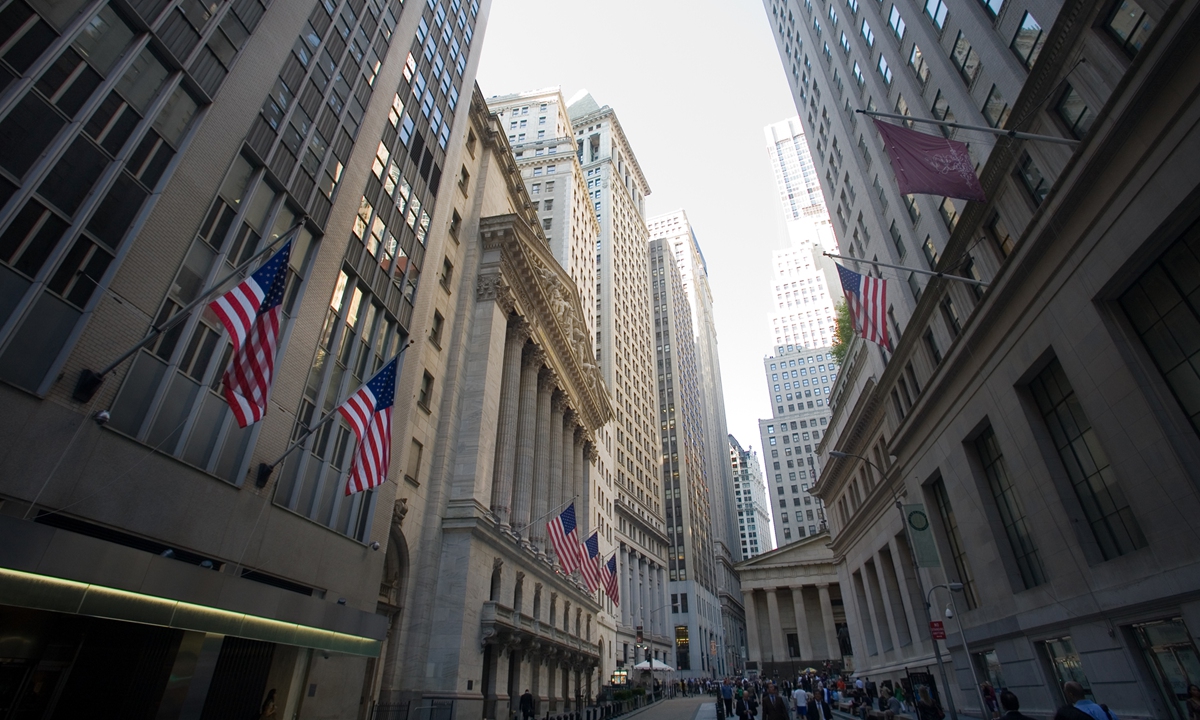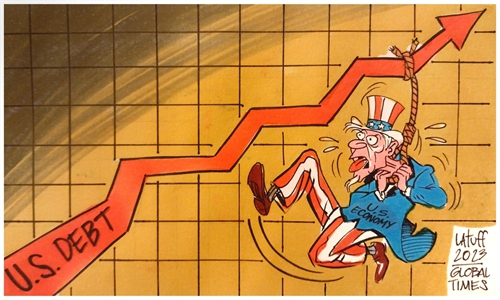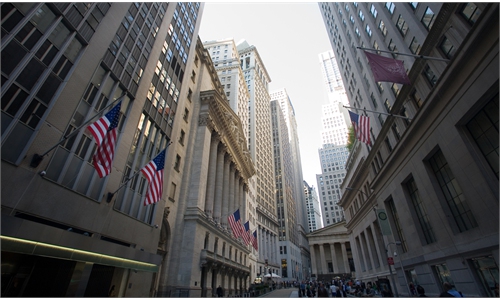Fitch places US credit on rating watch negative as deadlocked Congress hinders resolution on debt ceiling
Overdraft on dollar, bond credit prompts investors' move to safe haven markets, currencies: experts

A view of Wall Street in New York, the US Photo: IC
Fitch Ratings has placed the US "AAA" rating on "rating watch negative," signaling that the Congressional deadlock around debt ceiling negotiations may get worse, prompting investors to seek safe haven markets and currencies, experts said.
Fitch, one of the top three credit rating agencies along with Moody's and S&P Global, said in a statement on Wednesday that the "rating watch negative" reflects increased political partisanship that is hindering a resolution to raise or suspend the debt limit despite the fast-approaching X date, or the day that the US will be tapped out of funds to pay the nation's obligations.
US Treasury Secretary Janet Yellen warned Congress in a letter on Monday that the US government might not be able to pay its bills as early as June 1, if Congress does not act to raise or suspend the debt ceiling.
The US reached its $31.4 trillion debt limit on January 19 this year, and the Treasury began taking extraordinary measures to avoid breaching the ceiling.
"The brinkmanship over the debt ceiling, failure of the US authorities to meaningfully tackle medium-term fiscal challenges that will lead to rising budget deficits and a growing debt burden signal downside risks to US creditworthiness," Fitch said.
Although risks have risen that the debt limit will not be raised or suspended before the X date, Fitch still expects a resolution to the debt limit before that day.
Throughout history, the US government has approached and exceeded the debt limit multiple times. In each instance, policymakers eventually came to a compromise to raise the debt ceiling and avoid a default.
Failures leading to a debt default would, however, lead Fitch to cut affected debt securities to a "D" rating, with others downgraded to "CCC" and "C."
A possible downgrade by Fitch has triggered memories of 2011, when Congress increased the debt ceiling just before the X date. Then, S&P downgraded the government's credit rating to AA+ from AAA, resulting in a cataclysmic market with the dollar sold off and the stock market nose-diving.
"The symbolic move by Fitch is putting pressure on its peers to follow suit," Zhou Maohua, an economist at Everbright Bank, told the Global Times on Thursday.
"Although a deal is likely to be struck at the last moment, the fact is that the US debt level has been snowballing. The long-term debt ceiling fight among US lawmakers shows that the US has faced up to severe debt problems, which are essentially an overdraft on the credit of the US dollar and its debt," Zhou noted.
If a technical default occurs, it will wreak havoc on the US economy, which is under pressure from high inflation, and confidence in dollar-denominated assets including US government bonds would be hit hard.
The American economy will hardly be slammed alone, meaning that the default will swiftly have repercussions on the global market, observers have warned.
"A possible default will have a direct impact on its creditors, cast a shadow over economic growth, while affecting expectations of a global economic recovery," Chen Li, chief economist of Chuancai Securities, told the Global Times on Thursday.
The latest forecast for US real GDP growth this year has been marked down from 1.4 percent to 1.2 percent and from 1.5 percent to 0.9 percent for 2024 as the US economy's outlook is clouded by banking stress and massive federal budget deficits, S&P Global Market Intelligence said in a report sent to the Global Times on Thursday
"While the forecast assumes that the federal debt ceiling will be raised in time to avoid a default, the current impasse is rattling financial markets and is expected to cause a temporary drop in stock prices," the report said.
The S&P 500 Index has been falling, and investors are seeking safe haven assets to avoid rising risks.
"Gold, structured notes with deep downside protection, and other safe haven currencies like the Swiss Franc, yen or euro may provide some portfolio protection," JP Morgan said in a report earlier this month.
Some overseas investment institutions are paying more attention to the Hong Kong market and the Chinese mainland's A-share market from the perspective of risk aversion, according to Chen.
Mao Ning, a spokesperson for China's Foreign Ministry, told a press briefing on Tuesday that while the debt ceiling issue is an internal US affair, the US situation and policy choices will have a major spillover effect on the world economy.
"It is hoped that the US will adopt responsible fiscal and monetary policies, and not shift its domestic risks to the rest of the world, while refraining from undermining the world to safeguard its own interests," Mao said.




